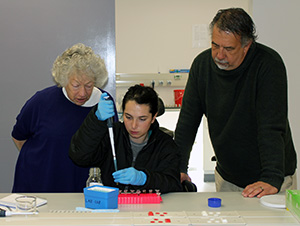Latest News Archive
Please select Category, Year, and then Month to display items
06 November 2020
|
Story Rulanzen Martin
|
Photo Supplied
 Dr Tronél Hellberg, UFS alumna, completed her PhD in Music from the OSM in 2018.
Dr Tronél Hellberg, UFS alumna, completed her PhD in Music from the OSM in 2018.
The COVID-19 pandemic and subsequent lockdown has posed many challenges. Not only has it distrupted our normal way of life it but has created a ‘new normal.’ Even in these trying times, alumni from the University of the Free State (UFS) have adjusted to the new normal by going above and beyond to make it as normal as possible.
One of these is Dr Tronél Hellberg, an alumna from the
Odeion School of Music at the UFS, who has supported Grade 12 learners by presenting free online prescribed music theory classes. The classes are beneficial for learners following the CAPS or IEB curriculum. “I trust the online videos will assist learners and teachers to get through this challenging Grade 12 year,” says Dr Hellberg. She has
recorded more than 38 live videos on her
G-Sential Theory of Music Facebook page.
The recordings are accessible to Grade 12 learners and their teachers at no cost. Dr Hellberg established the
G-Sential Theory of Music in 2007 and has since published 20 theory of music books.
Apart from assisting in teaching, one of her main objectives is to reach less fortunate learners who do not have access to music teachers. “Grade 12 music literacy requires an accumulative understanding of theory of music,” she says. With her initiative she also aims to “fill any gaps” to solidify knowledge and information which might still be unclear.
Monkey research attracts international attention
2016-07-11

Prof Trudy Turner from the University of
Wisconsin-Milwaukee and Prof Paul Grobler
from the Department of Genetics at the
University of the Free State, together with one
of the students researching monkey genes.
Photo: Siobhan Canavan
For this year’s Summer School programme, Prof Paul Grobler, from the University of the Free State Department of Genetics focuses on research about the conflict between monkeys and humans in areas where monkeys are regarded as problem animals.
Global expert part of research
This year, Prof Grobler is hosting a group of students and lecturers from the United States of America (USA). The group includes Prof Trudy Turner from the University of Wisconsin-Milwaukee (UWM), a global expert on vervet monkeys. She has been working with the Department of Genetics at the UFS for the past fifteen years, and has also been appointed as an Affiliated Professor in the department.
“The Summer School programme is an opportunity for the American Primatology students to gain practical experience in Africa,” says Prof Grobler.
International interest in Summer School
This year’s Summer School programme involves four lecturers and nine students. The lecturers are from the University of Wisconsin-Milwaukee (UWM), the University of California, Los Angeles (UCLA), Boston University, and Central Washington University.
“We use the genetic information to determine
how monkeys historically infiltrated the
different areas in South Africa.”
This year’s focus is on the genetic structure of the monkeys in South Africa, and research that is being done on the differences and similarities in monkeys from different areas. “We use the genetic information to determine how monkeys historically infiltrated the different areas in South Africa,” says Prof Grobler.
Local nature reserve acting as host
The group will perform field work, including observing monkeys in the Soetdoring Nature Reserve, as well as laboratory work in the department, where they will be assisted by two laboratory technicians.
Two years ago, Prof Grobler and his department tested this idea on a smaller scale, and now they hope to make this a regular event.